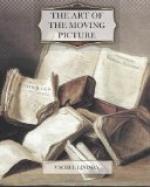This chapter does not advocate that the Church lay hold of the photoplays as one more medium for reillustrating the stories of the Bible as they are given in the Sunday-school papers. It is not pietistic simpering that will feed the spirit of Christendom, but a steady church-patronage of the most skilful and original motion picture artists. Let the Church follow the precedent which finally gave us Fra Angelico, Botticelli, Andrea del Sarto, Leonardo da Vinci, Raphael, Michelangelo, Correggio, Titian, Paul Veronese, Tintoretto, and the rest.
Who will endow the successors of the present woman’s suffrage film, and other great crusading films? Who will see that the public documents and university researches take on the form of motion pictures? Who will endow the local photoplay and the Imagist photoplay? Who will take the first great measures to insure motion picture splendors in the church?
Things such as these come on the winds of to-morrow. But let the crusader look about him, and where it is possible, put in the diplomatic word, and cooeperate with the Gray Norns.
CHAPTER XVIII
ARCHITECTS AS CRUSADERS
Many a worker sees his future America as a Utopia, in which his own profession, achieving dictatorship, alleviates the ills of men. The militarist grows dithyrambic in showing how war makes for the blessings of peace. The economic teacher argues that if we follow his political economy, none of us will have to economize. The church-fanatic says if all churches will merge with his organization, none of them will have to try to behave again. They will just naturally be good. The physician hopes to abolish the devil by sanitation. We have our Utopias. Despite levity, the present writer thinks that such hopes are among the most useful things the earth possesses.
A normal man in the full tide of his activities finds that a world-machinery could logically be built up by his profession. At least in the heyday of his working hours his vocation satisfies his heart. So he wants the entire human race to taste that satisfaction. Approximate Utopias have been built from the beginning. Many civilizations have had some dominant craft to carry them the major part of the way. The priests have made India. The classical student has preserved Old China to its present hour of new life. The samurai knights have made Japan. Sailors have evolved the British Empire. One of the enticing future Americas is that of the architect. Let the architect appropriate the photoplay as his means of propaganda and begin. From its intrinsic genius it can give his profession a start beyond all others in dominating this land. Or such is one of many speculations of the present writer.




